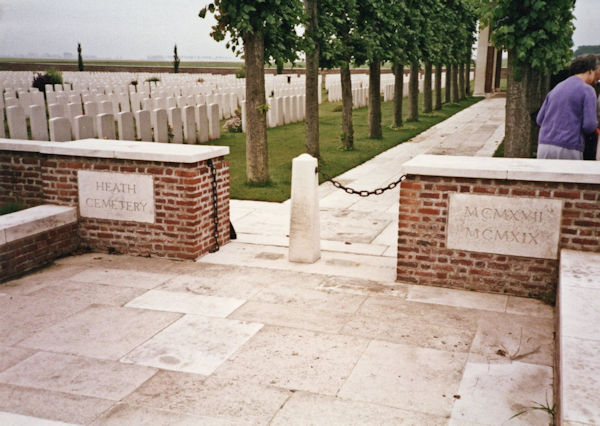Name
Harold Edward Pope (MC & Bar)
30 May 1882
Conflict
First World War
Date of Death / Age
24/08/1918
36
Rank, Service Number & Service Details
Captain
Royal Garrison Artillery
118th Heavy Bty. transf. to 1st/2nd Lancs. Heavy Bty.
Awards: Service Medals/Honour Awards
1914 /15 Star, British War and Victory medals
Military Cross and Bar
Cemetery/Memorial: Name/Reference/Country
HEATH CEMETERY, HARBONNIERES
III. E. 8.
France
Headstone Inscription
THE LORD OF HOSTS IS WITH US PS.46.7
UK & Other Memorials
Tring Town Memorial, St Peter & St Paul Church Roll of Honour, Tring
Pre War
Harold Edward Pope was born on 30 May 1882 (baptised 16 Jul 1882) to the Reverend Arthur Frederick Pope, and Catherine Isabella Ellen (nee Rose).
On the 1891 Census the family of parents, Harold, James (born 1884), Muriel E (born 1885), Cuthbert John (born 1887) and Hugh R (born1889) were living at the Furlong, King Street, Tring.
On the 1901 Census the family of parents, Harold (undergraduate), James, Muriel were living at 3&5 Wellington Street, Nairn, Scotland. On the 1911 Census his mother and father had moved back to the Furlong, Tring.
He went up to New College, Oxford, from Mr. T. H. Mason’s school at Rottingdean. Always a keen student of natural sciences he gained a First in the Natural Science School in 1904. His chosen career was as a mining engineer, and after a course at the Royal School of Mines, South Kensington, went to Borneo in the service of the Borneo Company, and subsequently joined a large gold and oil company in Sumatra as a geologist.
Wartime Service
Harold returned to UK from abroad having resigned his position on hearing of the outbreak of the Great War and enlisted in the Inns of Court Officer Training Corps at Berkhamsted. No Service Record was found for Harold. He was commissioned on19 Mar 1915 as 2nd Lieutenant in the Royal Garrison Artillery. In Jun 1915 he went to France with 118 Heavy Battery but was transferred to 1st/2nd (Lancashire) Heavy Battery who were serving 57 (West Lancashire) Division, a Territorial Force formation.
At the time of his death on the 24th Aug 1918, Captain Pope was acting as Heavy Artillery Liaison Officer of the 32nd Division. He was killed at Bayon-Villers near Amiens by a bomb dropped by an enemy aircraft − the explosion also killed Major L. H. Amory and wounded a number of other personnel.
From the Parish Magazine, October 1918: “Harold Edward Pope, at the outbreak of war, when the news of hostilities reached him in Sumarta and Java at once resigned from a very good position and returned home to take part in this struggle for our existence as a nation. He joined the Inns of Court O.T.C, as a trooper, and on the completion of his training, was immediately given a commission in the Royal Garrison Artillery. In June of 1915, he crossed with the 118th Heavy Battery to France, but owing to a reorganisation was transferred to 1st/2nd Lancashire Heavy Battery.
For over three years he served continuously in France, and assisted in practically every large operation that has taken place on the western front during that period. He was awarded The Military Cross on the 16th Aug 1917 for an act of great bravery. The official description of which is as follows: ‘He showed the greatest personal courage and presence of mind in combing on the top of a blazing gun pit and extinguishing a fire which was threatening to blow up the whole of the ammunition at any moment. There were thirty rounds of high explosive shells in the blasting pit whilst he was standing on the top.’ For another act of equal gallantry, on 5 Feb1918 he won a Bar to his Military Cross at Gouzeaucourt, a village, between Peronne and Cambrai. The incident is thus described in the London Gazette: ‘He kept his battery in action under direct machine gun fire and sniper fire and checked the enemy’s advance. He did not cease fire till the enemy was within two hundred yards and the infantry had withdrawn through the position. He then personally superintended the dismantling of his guns’.
A brother officer of his thus writes of him: "To the battery his death is the greatest blow it has yet received in France. Our good name was due so greatly to his bravery, hard work, and great example. He can fitly be described as a very gallant officer and a gentleman, and as such he was beloved and trusted by all ranks. There is not a man who does not feel his loss.”
Additional Information
War Gratuity of £19 10s and arrears of £219 3s 3d was paid to his sister Muriel.
Brother Cuthbert joined the Royal Navy in 1902 and was loaned to Royal Australian Navy College in Jan 1914. At the outbreak of the Great War he remained in Australia and served on HMAS Sydney (which sank the Commerce raider Emden) and survived the Great War to have a successful career both in peacetime and WW2.
Acknowledgments
Neil Cooper
Jonty Wild



